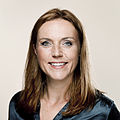| Minister of Integration | |
|---|---|
| Integrationsminister | |
 | |
| Ministry of Immigration and Integration | |
| Type | Minister |
| Member of | |
| Reports to | the Prime minister |
| Seat | Slotsholmen |
| Appointer | The Monarch (on the advice of the Prime Minister) |
| Formation | 27 November 2001 |
| First holder | Bertel Haarder |
| Succession | depending on the order in the State Council |
| Deputy | Permanent Secretary |
| Salary | 1.400.192,97 DKK (€187,839), in 2024 [1] |
| Website | Official website |
Minister for Integration (Danish : Integrationsminister) is a Danish ministerial office. The office was created by Prime Minister Anders Fogh Rasmussen on 27 November 2001 when he formed the Cabinet of Anders Fogh Rasmussen I after the 2001 Danish parliamentary election, in which refugees, immigration, and integration of people from non-western countries had been important issues.
One of the stated goals of the Anders Fogh cabinet, and especially the supporting Danish People's Party which secured the government's majority, was to "stem the flow" of refugees to Denmark, and new tougher rules did drastically reduce the number of refugees being granted asylum. Another initiative was the 24 year rule, which stated that spouses must be 24 or older before they could immigrate to Denmark through family reunification (there had been many cases of arranged marriages of young people being used to get around immigration restrictions).













